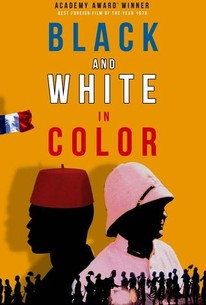Directed by Jean-Jacques Annaud
Written by Jean-Jacques Annaud (story), Georges Conchon (screenplay)
Starring Jean Carnet, Jacques Dufilho, Jacques Spiesser, Catherine Rouvel
IMDB Entry
There are plenty of antiwar films but none as charming as Black and White in Color.*
It's set in a small village in French Equatorial Africa near the border of the German colony of Kameron in 1915. Life is idyllic if a bit boring, with the genial Germans often crossing the border for supplies. Hubert Fresnoy (Jacques Spiesser) is a geographer observing the country and missing what's going on back in Paris. He finally gets a shipment of newspapers and one of the villagers spots one that tells that France is at war with Germany. He decides that they should attack. Fresnoy warns against it, but patriotic fervor takes over and they quickly (far too quickly) put up a force to attack the Germans.
It's a fiasco. The Germans are trained soldiers with a Gatling gun and the French solders have to retreat. They ask Fresnoy to take care of things and he reluctantly starts to train an army.**
The movie is less about war as it is about the quirky characters of the village. Still, it satirizes both war fever and colonialism.
The movie was produced by and shot in the Ivory Coast and won the Oscar for Best Foreign film. First-time director Jean-Jacques Annaud had several successes, including Quest for Fire, The Name of the Rose, and Enemy at the Gates.
________________________________________________________________
*The original French title was La Victoire en chantant, the first lines of a French military song. The title was changed for the US market, since no one would get the reference. Strangely, when it was reissued, the title changed to a French translation: Noir et Blancs en couleur to match the US title. That turned it into a pun, since it sounds like Noir et Blancs en colère -- Blacks and Whites angry.
**Nothing to with the story, but I was reminded of German general Paul von Lettow-Vorbeck, who commanded the forces in German East Africa (present day Tanzania). He knew that nothing he could do would change the course of the war and decided his role was to harass British troops in Kenya to keep them away from the trenches. He was possibly the most successful Commander of World War I.

